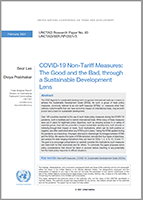
The 2030 Agenda for sustainable development recognizes international trade as a means to achieve the Sustainable Development Goals (SDGs). As such, a group of trade policy measures, commonly referred to as non-tariff measures (NTMs), i.e. measures other than ordinary customs tariffs that can have economic impact on international trade, may be both a boon and a bane for sustainable development.
Over 140 countries resorted to the use of such trade policy measures during the COVID-19 pandemic, both to facilitate and to restrict international trade. While many of these measures were put in place for legitimate policy objectives, such as ensuring access to or safety of essential goods, they had the potential to impact sustainable development, both directly or indirectly,through their impact on trade. Such implications, which can be both positive or negative, are often overlooked when any NTM is put in place.
Taking the NTMs applied during the pandemic as a backdrop, this paper attempts to disentangle the linkages between NTMs and the SDGs. We explore the types of NTMs adopted, decode their four types of objectives, and assess the wide-ranging implications they can have for SDGs 1, 2, 3, 8, 10, 15 and 17. The goal is to encourage policymakers to carefully consider the implications such measures can have both for their economies and for others.
To conclude, the paper proposes some policy considerations that should be taken in account before resorting to any potentially harmful trade policy response to difficult situations.




